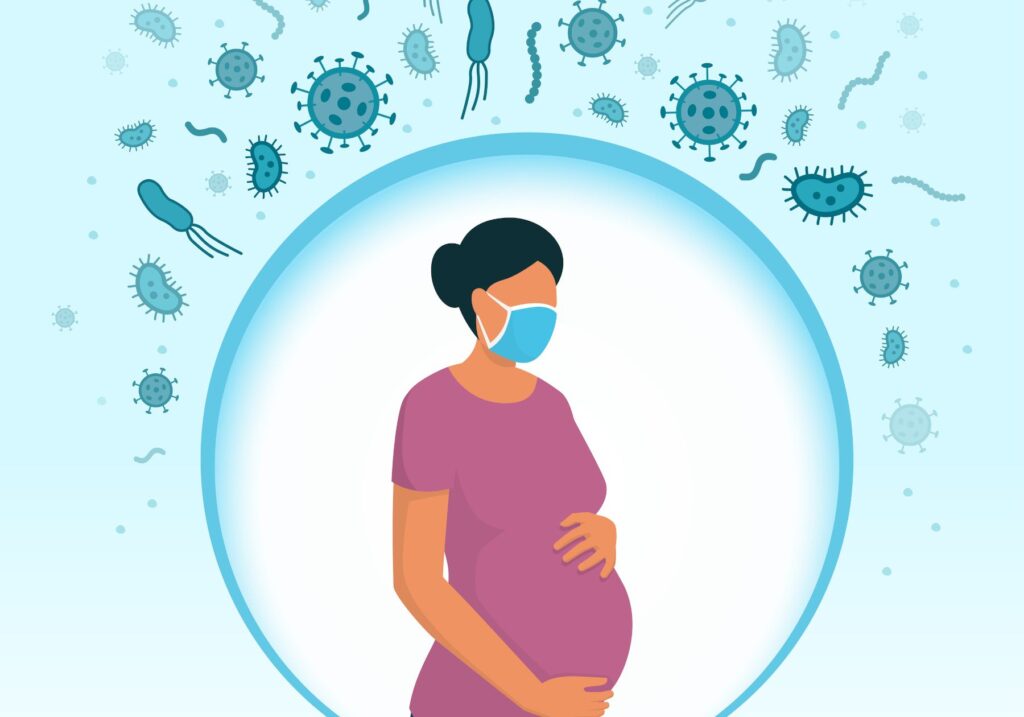Some women experience health problems during pregnancy. These complications can involve the mother’s health, the fetus’s health, or both. Even women who were healthy before getting pregnant can experience complications. These complications may make the pregnancy a high risk pregnancy
Anaemia
Anaemia is a disorder caused by a deficiency in the blood. The most common is a lack of iron or folic acid. During pregnancy the blood has to supply the baby’s placenta with oxygen as well as maintaining your own supply. Oxygen is carried by haemoglobin in the red cells. This is why your haemoglobin is checked during pregnancy. Some types of anaemia are inherited.
Signs of anaemia are: tiredness, lack of energy, shortness of breath, heart palpitations. dizziness, loss of appetite.
Prevention of anaemia:
- an iron-rich diet (see section on Diet). The best source of iron is red meat.
- foods and juices containing Vitamin C, which helps the body absorb iron.
- avoid tea and coffee as they can reduce absorption of iron.
Treatment of anaemia
Iron or Folate-deficiency anaemia is usually a simple matter to treat with supplements available from the chemist. Your midwife or doctor will advise you when this is necessary.
Vaginal Bleeding
If the bleeding is heavier than a period you should seek advice. If you are less than 20 weeks pregnant, contact your obstetrician and ask for an immediate appointment. If more than 20 weeks, contact the maternity unit of the hospital where you will be delivered. Lighter amounts of bleeding, if there is no pain, should be reviewed as soon as possible. If there is pain, contact either your obstetrician or the maternity unit.
Diabetes
Some women may develop a temporary elevation of the blood sugar level. This is called “gestational diabetes” as the blood sugar level usually returns to normal after the baby’s birth. It is advisable for all pregnant women to be tested between 24 and 28 weeks of pregnancy. The laboratory takes a fasting blood sugar level following by a sweet sugar drink and then a blood test at 1 and 2 hours post drink. The test itself takes about 2½ hours. If diabetes does occur during pregnancy, it is extremely important to control your blood sugar levels in the normal range. This can be achieved by diet and exercise. In some cases, Insulin injections are needed until after the baby’s birth.
Pre-eclampsia
Pre-eclampsia is a potentially serious complication of pregnancy. It involves high blood pressure and/or increased protein in the urine (it is normal to find a trace of protein in the urine samples of pregnant women).
Other symptoms can include headaches, blurred vision, nausea and abdominal pain. If you have any of these symptoms, contact your doctor or hospital.
Pre-term labour
This refers to labour which begins before the 37th week of pregnancy. Signs of pre-term labour can be vague but include backache which comes and goes, period-like pain or cramps, a “show” (a blood-stained mucous plug) or actual uterine contractions. If any of these are happening, contact the Maternity Unit at your hospital.
Premature rupture of membranes
This means that your sac or bag of waters surrounding the baby breaks before the 37th week. This can happen even if the labour has not yet started.
Warm clear fluid can leak slowly out of the vagina or come out in a sudden gush. If it is coming out slowly, you may think it is urine, but it smells different and it should be clear. The bag of waters protects the baby from the outside world. If you think your bag of waters has broken (your membranes have ruptured), it is essential to contact the Maternity Unit.
Urinary Tract Infection
During pregnancy, there is more fluid flowing through your system. This means that your kidneys have to work harder and there is a greater chance of getting an infection of the bladder, kidneys or urinary tract.
The frequent urge to pass urine, a burning sensation when passing urine, lower backache, groin-ache and sometimes cramps in the lower abdomen are all signs of a possible urinary infection. If you develop any of these signs, contact your doctor or midwife so that treatment can be started before the infection becomes more severe.

Prevention of Haemolytic Disease of the Newborn / Rhesus disease
Haemolytic Disease of the Newborn (HDN) only occurs if the mother is Rhesus (Rh) negative and the baby is Rhesus positive. Foetal blood cells can cross the placenta and enter the mother’s circulation. This can happen in a normal pregnancy or in certain situations such as when amnioscentesis is performed, a miscarriage or an event such as a motor accident or a major blow to the abdomen. As a result of the baby’s red cells entering the mother’s circulation, she can develop abnormal antibodies which can subsequently affect future pregnancies.
To reduce the risk of HDN, the Health Department has recommended that Rhesus negative women should have Rhesus immunoglobulin injections at 26 – 28 and 32-34 weeks, as well as at delivery. It is also recommended following sensitising events such as miscarriage, termination of pregnancy, amnioscentesis or abdominal trauma.
Where does Rhesus (D) immunoglobulin come from?
Injections of Rhesus (D) are made from plasma of carefully selected blood donors. In Australia to date, there has never been a confirmed case of transmission of Hepatitis B or C or HIV from Rhesus (D) immunoglobulin products supplied in Australia. The risk or viral or other infective agents’ activity, however, cannot be totally eliminated.
